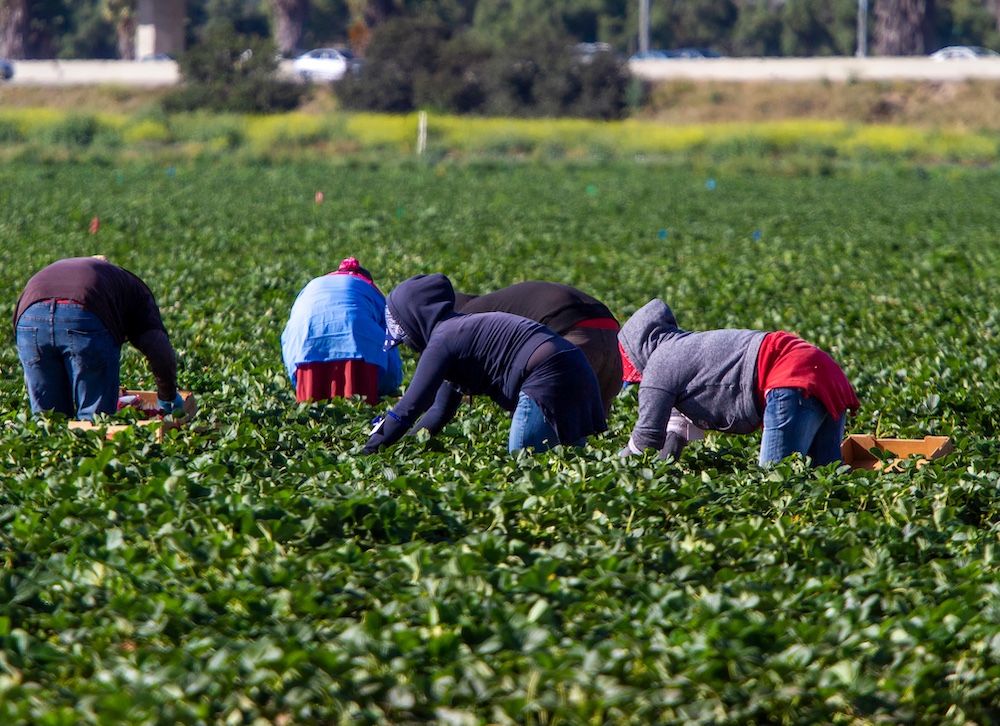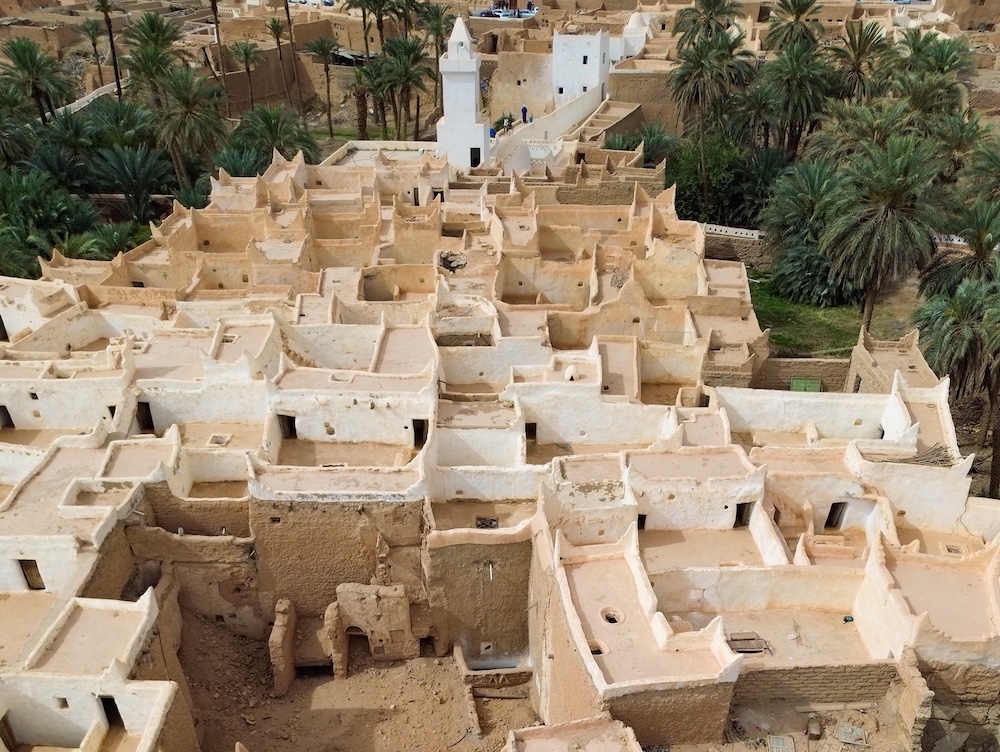The Contours of Techno-Authoritarianism Research Group aims to study the critical intersection between technology, politics, power, and space in the 21st century. Specifically, they aim to better understand the rise of cyberlibertarianism, venture capital extremism, secessionism, and techno-fascism/techno-authoritarianism. They will examine such issues as: how media and flows of information are controlled; how anti/post-state development intersects with far-right extremist ideologies; how they have moved from fringe to mainstream; and how these ideologies are being made concrete with technical infrastructures such as AI, blockchain, and cryptocurrency.
Research Team
Farmworker Justice Research Team
Farmworkers make up one of the most vulnerable labor forces in the United States despite their essential role within the agricultural industry. This team's research addresses the following questions: (1) What are the major disciplines and topics that make up farmworker research? (2) What are the major contributions of this research, and what methods do they employ? (3) How can these contributions be combined to create a farmworker justice framework that provides a more comprehensive and holistic understanding of farmworker vulnerabilities, thus informing future research efforts and policy developments? Through an extensive interdisciplinary review, they seek to develop a farmworker justice framework that can inform future research and policy interventions concerning agricultural laborers.
Research Team
La Colectiva
La Colectiva grapples with navigating the sociopolitical and cultural dimensions of the academic terrain as Latinx graduate students and theorizing and making sense of their multiple positions as scholars, researchers, practitioners, educators, healers, and members of our communities. This research team turns to testimonios (personal narratives) to elucidate individual and collective narratives of challenge, resistance, empowerment, and transformation. This embodied theory of transformation is the foundation of our group. La Colectiva focuses on the central question: What methodological frameworks enable us to coexist, embracing our intersecting identities instead of separating our emotions from our research?
Research Team
Embodied: Critical Logistics and Empire Research Team
The question at the heart of this research team is: how can global capitalism — a system propped up by logistics and technology — be made comprehensible? On the one hand, these systems are ideologically presented as historically inevitable and necessary. On the other, capitalism appears unintelligible, ambiguous, nonsensical, labyrinthine; it presents itself in different languages, shapes and mediums, and it seems impossible to grasp or battle such a shapeshifting force. Therefore, instead of attempting the impossible project of mapping out capitalism into a holistic picture, the team attempts to locate or assemble the shifting openings, cracks, chokepoints, spillages, or leaks, which undo and warp the demarcated boundaries between bodies, nations, and capital that are continuously enforced by colonial, ideological, and corporate empires.
Research Team
Asian Infrastructures and Expert Networks Research Team
The Asian Infrastructures and Expert Networks research team investigates how expert networks have historically contributed to the successful implementation of industrial policy and large-scale infrastructure development in East and Southeast Asia. Through a focus on the Chinese electricity sector, they examine how engineers, economists, planners, and policymakers collectively translated national sectoral goals into coordinated infrastructural outcomes. Drawing from disciplines including history, economics, planning, and political ecology, they examine how configurations of state, expertise, and labor enabled the expansion of critical infrastructure and supported the rise of East and Southeast Asian countries in the global economy.
Research Team
Filmmaking as a Social Science Method Research Team
This interdisciplinary research group investigates the use of filmmaking as a methodological and epistemological tool in the social sciences, proposing an expanded approach to the study of social phenomena. Firmly situated in the historical development of global capitalism and Western hegemony, film production has long been a medium for both reflecting and disrupting power and ideology, offering insights into economies of representation. By critically engaging with the aesthetic dimensions of filmmaking — such as composition, lighting, editing, and sound — this research team asks how visual representation constructs, destabilizes, and amplifies the ideological and relational dynamics embedded in traditional social science methods like ethnography and participant observation.
Research Team
Letters of the Sahara: Towards a Digital Toolkit for Mapping Language Change, Social Networks, and Units of Exchange in 19th-Century Arabic Correspondence to/from Ghadames (Libya)
As imported European paper became cheaper and more easily obtainable in the Sahara Desert and its hinterlands in the 18th and 19th centuries, the practice of letter-writing grew enormously. As in other parts of the world, letter-writing made it possible for distance to be bridged in new ways, drawing far-flung people into circuits of information exchange. This project seeks to explore how letter-writing in this period contributed to broader economic historical changes in commercial practices associated with trans-Saharan trade, availability of credit, recoverability of debt and inheritances. The team will focus on one set of letters sent to/from the ancient northern Saharan town of Ghadames, in modern-day Libya.
Research Team
Commons and Property in the Climate Crisis Research Team
This Matrix Research Team brings cutting-edge research into dialogue with established debates on the commons to interrogate a central research question: To what extent do historical, existing, and imagined examples of the commons — from the precapitalist village, the urban commune, or the global commons — offer models for sustainable and democratic forms of social ecology in an era of accelerated land grabs, resource extraction, and anthropogenic climate change?
Research Team
The Zones of Incommunicability and Biomedicine Research Team
The Zones of Incommunicability and Biomedicine Research Team seeks to analyze how linguistic practices and biomedical knowledge come together to shape health behaviors, policies, and forms of care for some populations while constructing others as unworthy of it. The team's members come together as medical anthropologists, linguists, public health researchers, artists, physicians, journalists and scholars in education, disability studies, black studies, and education to shed light on the power dynamics and cultural narratives that undergird the health and biomedical landscape.
Research Team
Tox-Ecologies Collective Research Team
The Tox-Ecologies Collective grapples with the enduring legacies of colonialism and capitalism, the continued uneven restructuring of our material and relational worlds, and the altered forms of life and sociality that emerge within these affected spaces. Since the late 2000s, epistemological and theoretical interventions across critical disability studies, Indigenous STS, and racial geographies have catalyzed new ways of seeing ourselves and toxins and have provided new grammars for understanding and narrating environmental harm, which in turn has offered more creative horizons of possibility. The Tox-Ecologies Collective is invested in asking what methods might be used to attend to how contamination and pollution alters our bodies and worlds and what new relations are made possible when we develop new analytic frames to understand our contemporary planetary conditions.
Research Team
Legal Geography Research Team
This research team aims to bring together graduate students from various fields, including law, urban planning, geography, and beyond, to foster a vibrant exchange of ideas on contemporary spatial and legal challenges. By delving into the intersection of law and geography–both through analyzing classical and foundational texts as well as drawing on critical perspectives in postcolonial studies, feminist geographies, and critical legal studies–we aim to uncover new perspectives, challenge conventional wisdom, and chart innovative pathways for research and scholarship. Our inquiry is motivated by the recognition that legal frameworks are not neutral instruments of governance, but are embedded within broader social, spatial, and economic contexts that (re)produce injustice.
Research Team
Industrial Policy Research Team
Industrial policy is an interdisciplinary policymaking approach that instrumentalizes specific markets as mechanisms for achieving economic and political outcomes. Industrial policymaking is more than a subject of disciplinary study, but potentially a site for disciplinary formation around specific policy areas, such as climate change or housing. There may be opportunities in iterating on novel approaches and methodologies by synthesizing and applying the various disciplinary contributions. The aim of this research team is to bring useful contributions to the space of governance at a time in which the challenges we may address in doing so has never been more urgent.











